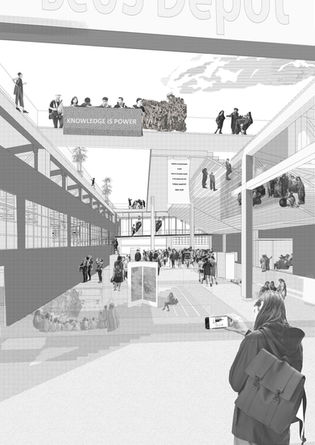Reimagining a Bus Depot as a Civic Interface for Knowledge and Dialogue

BeUS Depot proposes the adaptive reuse of a bus depot in Tuen Mun, transforming it into a civic hub for public discourse and knowledge exchange. Against the backdrop of increasing social fragmentation and limited platforms for communication, the project explores how architecture can serve as a neutral interface—facilitating dialogue, understanding, and civic participation.
While architecture alone cannot resolve political complexities, it can shape inclusive spaces where citizens engage in discussion on equal footing. By rethinking the typology of infrastructure, this project envisions the depot as a place for shared learning, critical debate, and informal gathering.
Urban Context
Strategically located in Tuen Mun - an emerging transit node between Hong Kong and Shenzhen—the project leverages its position to strengthen both local and regional connectivity. Through integrating water routes, railways, and highways, BeUS Depot serves as a civic landmark that bridges residential and industrial zones, and connects the New Territories with Kowloon and Hong Kong Island.
Architectural Approach
At its core, the proposal reimagines the bus depot as a platform for public services and learning. A layered program of classrooms, libraries, and open debate spaces creates an evolving ‘Street of Knowledge,’ continuously populated with materials, exhibitions, and events that support dialogue. This civic spine is designed not to produce consensus, but to encourage understanding—equipping communities with shared knowledge and a space for respectful exchange.
Year: 2020








